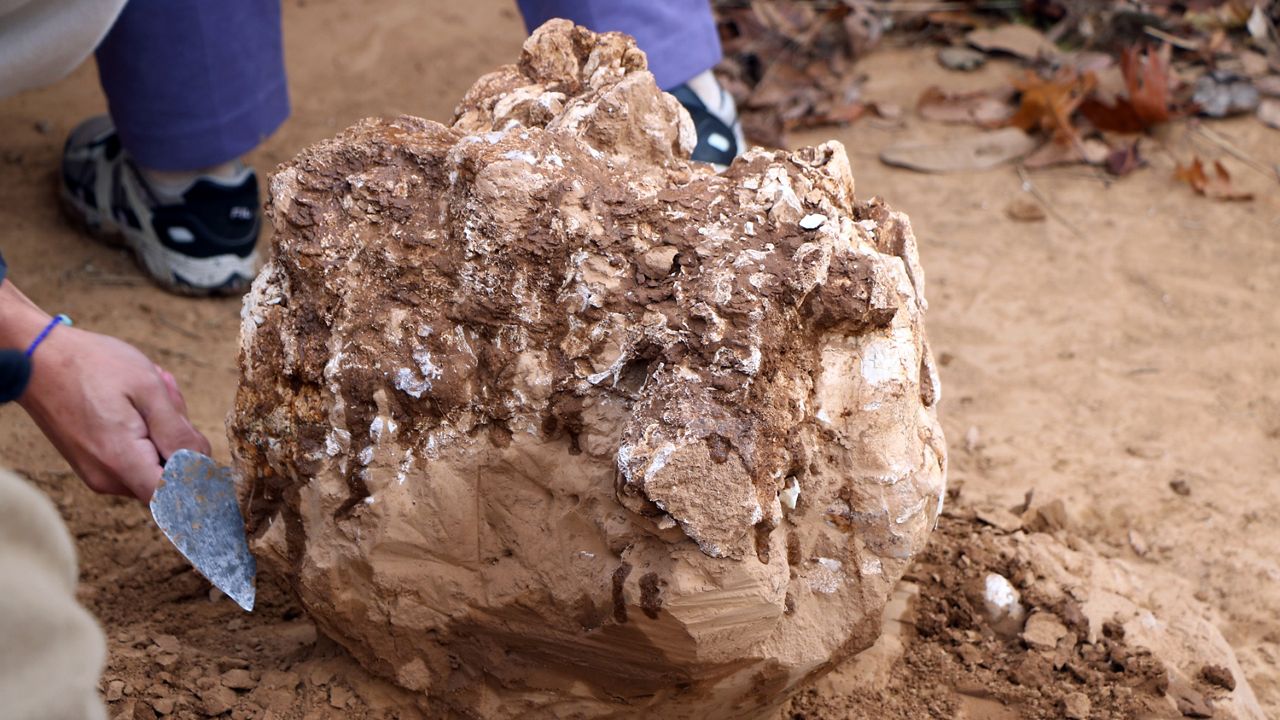ELSAH, Ill. — The skull of a 27,500-year-old mastodon was successfully excavated at Principia College in Illinois Thursday afternoon by students and their professor.
This is part of an ongoing, years-long archeology dig of the extinct animal, according to Dr. Andrew Martin, associate professor and chair of sociology and anthropology at Principia College.
Dozens of visitors also witnessed the excavation of the skull as the public was invited this week to watch the dig, ask questions and learn more.
Mastodons roamed America for 100,000 years, Martin said. They even coincided with people for roughly 1,000 years.
The discovery on Principia’s campus was made in 2022 by facilities worker Mike Towell, while using a Bobcat on campus grounds. Towell stopped the machine after realizing he had dug up something, which turned out to be a tusk.
Martin has been conducting this project in his archeology courses over the past two fall semesters. His students dig for three hours twice a week.
“It was a really good opportunity for experiential education,” Martin said.
“We have this wonderful porta cabin they can take classes in and then we go straight out onto the dig site and apply those skills, which is unique. Not many universities offer that.”
In addition to archeological skills, Martin’s students have learned how to use technology that gathers information and data. This has allowed them more time to focus on digging and excavating the mastodon.
Large bones and another tusk of the ancient animal remain to be found, which may be located next to where they already are digging. The rest of the project may take another few years to complete, according to Martin.
“There’s a lot to learn, there’s a lot to dig. Mastodons (were) big animals,” he said.
Since Martin’s students came to his class studying different majors, he tasked them with project assignments where they can apply skill sets related to their majors.
A chemist student helped supervise the project’s lab and figured out which chemicals to use to preserve the mastodon’s bones; biology students have studied the bones; computer scientist students developed a website tracking the project’s progress; and an artist drew one of the tusks.
“These are all skills needed for archaeology,” Martin said. “I try and find roles for each student that helps them apply their skills on the site.”
The mastodon, named Mike after the facilities worker, is believed to have died suddenly by a lightning strike during a dust storm as its tusk was found fried, almost like ash.
“We’re trying to piece together the story from limited amount of clues that we have,” Martin said.
“Archeology is a multidisciplinary subject, so it uses all the sciences to gather as much evidence from the earth and all the social sciences to try and reconstruct that evidence and recreate these prehistoric worlds.”
The ancient animals came to the area because of the lush vegetation in the summers, but the weather could be deadly to them in the winter.
“In the winter, when these dust storms would blow up, it be almost a death trap,” Martin said.
Principia College also is home to a mammoth, named Benny, that was found on campus 25 years ago. Martin mentioned that Benny may have died by choking to death during a dust storm.
Since a mastodon and a mammoth have been found on campus, Martin believes there could be more of these extinct animals buried deep underground. It’s difficult to know because digging several feet underground does not happen often.
The college campus was probably an “attractive place” for mastodons and mammoths because it is located near the Mississippi River and was near the tip of a glacier, which provided them with food, according to Martin.
“We can learn a lot about how the environment changes in macro ways by studying the past … and these animals that existed,” he said.
“We’ve learned there were trees on this landscape back in the ice ages, something we didn’t know before.”
Martin will be publishing an article soon on the college's website. The public can stay updated on the project’s progress by following Principia College.



